Click on the link to view the photostream from #Pepe2015 (Public Engagement and the Politics of Evidence Symposium) and to watch for videos of the conference at www.politicsofevidence.ca
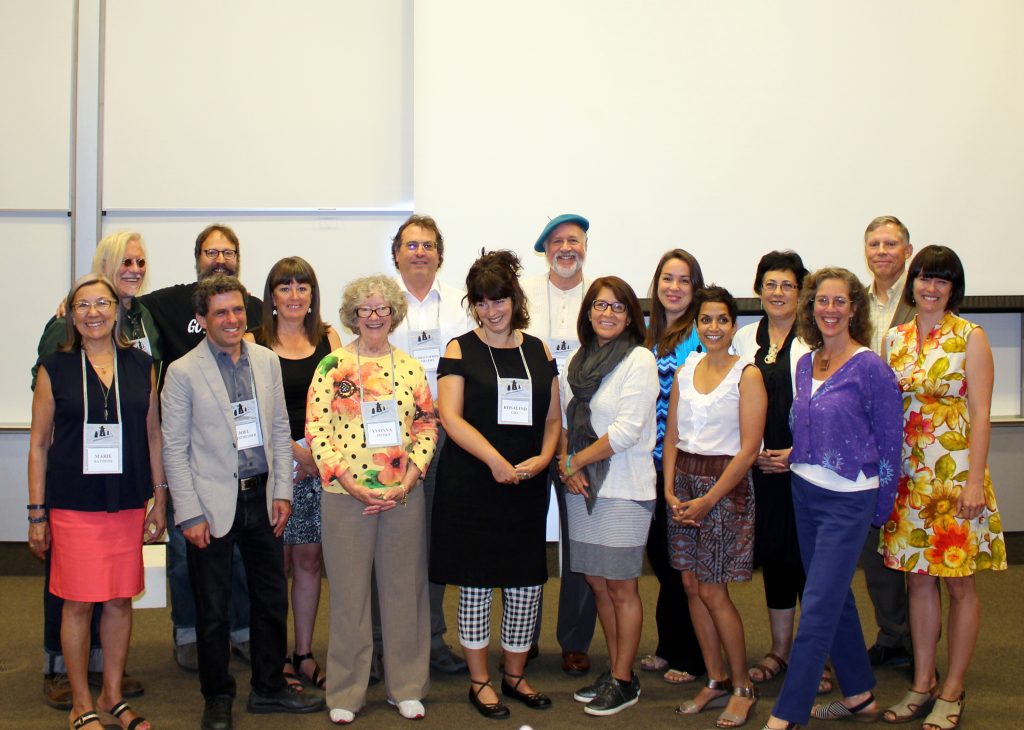
Click on the link to view the photostream from #Pepe2015 (Public Engagement and the Politics of Evidence Symposium) and to watch for videos of the conference at www.politicsofevidence.ca
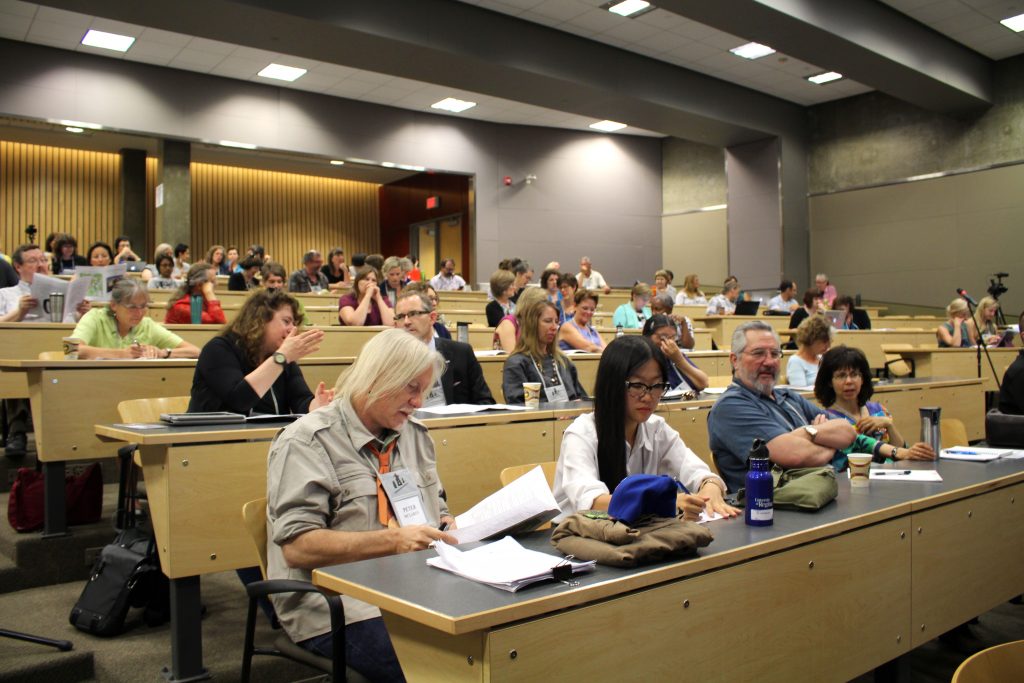
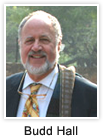 Written by Budd L. Hall on July 27, 2015
Written by Budd L. Hall on July 27, 2015
Marc Spooner and James McNinch of the Faculty of Education at the University of Regina were the co-chairs of a recent symposium held in the heartland of Western Canada. The symposium brought together some of the best known critical participatory research, Indigenous, decolonising, knowledge democracy and higher education scholars in North America with the notable international addition of Dr. Linda Tuhiwai Smith, Maori scholar and Pro-Vice Chancellor of the University of Waikato, Aotearoa. Other speakers included: Marie Battiste, Yvanna Lincloln, Leigh Patel, Chad Gaffield, Michelle Fine, Eve Tuck, Joel Westheimer, Rosalind Gill, Peter McLaren, Christopher Myers, Sandy Grande, Charlene Bearhead, Marcia McKenzie, and Nick Carleton. Notably Vianne Timmons, the President of the University of Regina and five other heads of Canadian universities were also in attendance.
Of importance to those of us alarmed by the misfit of the Western settler colonial knowledge dominated model of the modern university to the needs of the majority in the global South and the excluded North, is that some of the most respected critical scholars of the ‘West’ are also alarmed at the impact of neoliberalism on higher education. What is encouraging is that the nature of the critique is being strongly articulated and the call for a new narrative for higher education announced loudly.
The complicity of higher education in the epistemicide, the killing of the knowledge systems, of the Indigenous Peoples around the world took prominent place in discussions led by Indigenous scholars Battiste, Tuhiwai Smith, Tuck, Pete, Grande and Bearhead. Lincoln, Fine, Westheimer, Myers, McKenzie and Carleton chillingly illuminated the punitive role of accountability and audit culture in crushing critical and transformative thought. Linda Tuhiwai Smith importantly reminded us that for Indigenous peoples the pre-neoliberal university was in fact much worse!
Chad Gaffield, former President of Canada’s Social Sciences and Higher Education Research Council, the funding body that has supported so much community based research in recent years called for a new narrative for higher education that would transform a ‘mediaeval institution’ into a 21st century university.My own contribution framed as ‘Beyond Epistemicide: Knowledge Democracy and Higher Education’ documents how white male European knowledge through conquest and epistemological silencing has risen to global dominance and a misleading association with concepts of modernity and progress.
One could easily think that this was yet another academic conference that was long on critique but short on ideas for change. The call for us to do both critique and create was strong in all of the papers and discussions. The symposium itself was a creation of a space to re-imagine higher education in terms of social justice and hope. The symposium was up lifting. Why? First because of the quality of the critical analysis presented. Secondly because of the strong contributions of Indigenous women scholars, many of them young. Third because of the dozens of stories of higher education, knowledge democracy and action being taken in what some of us used to call ‘the belly of the beast’, And finally because of the spirit of mutual support, quality listening and hope that persists. This was a meeting that is a contribution to the idea that we are living in a time of a great turning…a transformation towards something else.
All of the talks have been video recorded and in time will be posted to the www.politicsofevidence.ca web site. Plans are also underway for an open access free of charge book.
See Budd’s blog at: http://unescochair-cbrsr.org/unesco/public-engagement-and-the-politics-of-evidence-in-an-age-of-neoliberalism-and-audit-culture/

The Public Engagement and the Politics of Evidence Symposium is currently taking place at the University of Regina. Follow the engaging lineup of speakers livestream at www.politicsofevidence.ca Follow the conversations on Twitter using #pepe2015.
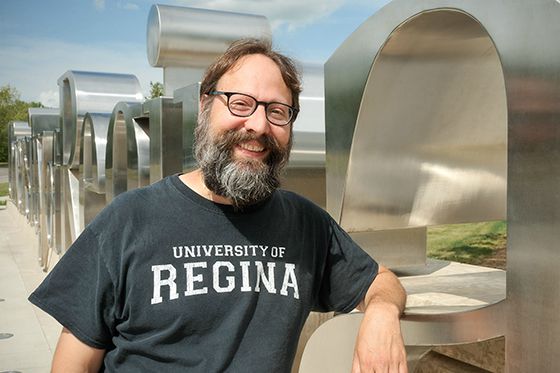
An international conference at the University of Regina from July 23 to 25, 2015, will explore ways of measuring the impact of research and being more accountable to the public.
“We have to rethink what forms the products of research will take. Peer-reviewed journal articles may not always be appropriate or even desirable,” explains Dr. Marc Spooner, a professor of Education at the University of Regina and a co-organizer of the event along with Dr. James McNinch.
About 20 world-class guest speakers from Canada, New Zealand, the United Kingdom and the United States will be making presentations. More than 100 guests are expected to attend the event, including university presidents, professors, community members, government officials.
“Also, we have to do a better job of engaging the public,” says Dr. Spooner. “We have to be effective at explaining and disseminating our research findings both to the public and also to policy makers, stakeholders, government – including public talks, not just at the university but in our communities as well.”
Dr. Spooner says it’s significant that this important international event is taking place at the University of Regina.
“The U of R is innovative and fresh enough in our thinking to dare to have these perhaps difficult conversations about what counts as research and why. It’s the same with research impact. We are nimble, open-minded, and creative. We are bold enough to challenge the status quo, to interrogate tradition, and to trust open dialogue.”
Dr. Spooner believes that what counts as scholarly impact must continue to evolve.
“Important advances in community-based and participatory approaches to research – which involve our communities – continue to develop and become a more commonly applied type of scholarship,” he says.
“It means we are at the forefront of examining research impact and of engaging in meaningful scholarship. We have the opportunity to be a national and international leader in supporting and rewarding the wide array of valuable scholarship in all its manifestations our world so desperately needs,” he adds.
Reposted from U of R Feature Stories
By Dale Johnson
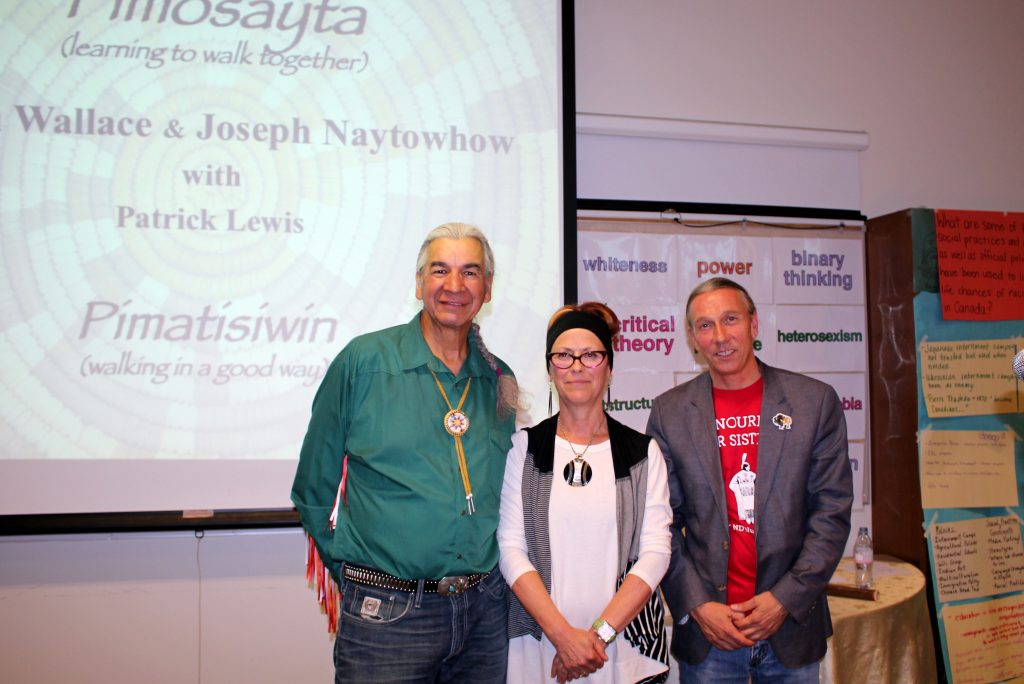
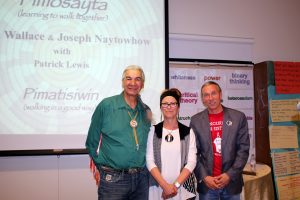
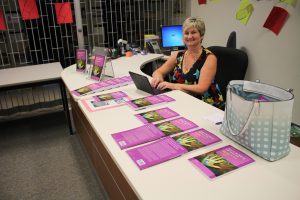
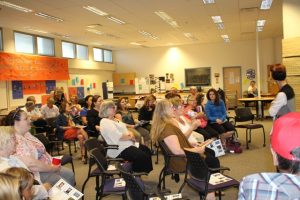
Above: Photos from the Book Launch and Narrative performance Pimosayta (Learning to Walk Together) by Karen Wallace and Joseph Naytowhow with Patrick Lewis.
This moving performance included poetry readings by Karen Wallace, emerging out of her experiences as an art therapist; stories and songs by Joseph Naytowhow, a residential school survivor; and historical and context readings by Patrick Lewis.
To purchase a copy of Poetic Inquiry from the Art Therapy Studio by Karen O. Wallace go to www.sensepublishers.com
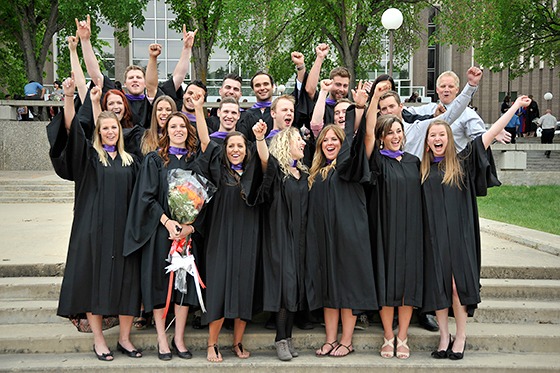
Dr. Nick Forsberg with some BEd (Physical Education majors) graduates celebrating Convocation 2015. Photo Credit: U of R Photography
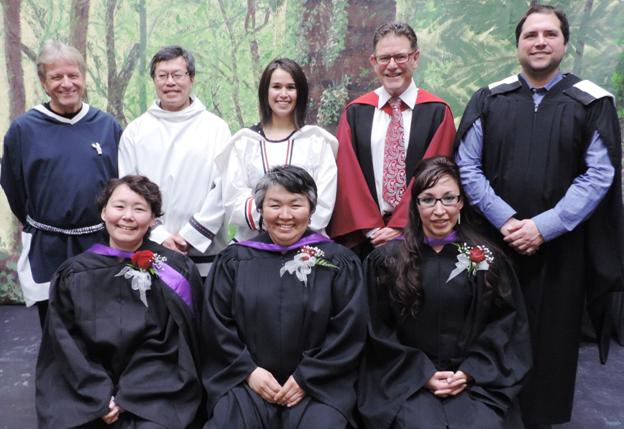
Congratulations to the following University of Regina Nunavut Teacher Education Program (NTEP) BEd graduates:
Nadia Sammurtok – Rankin Inlet
Louisa Meeko – Sanikiluaq
Sheba Pikuyak – Hall Beach
Jenny Ipirq – Iqaluit
Renata Lee – Iqaluit
RitaPorter – Gjoa Haven
Rhonda Nimiqtaqtuq – Gjoa Haven
Catherine Hiqiniq – Gjoa Haven
Eleanor Cipriano – Gjoa Haven
Abby Anavilok – Gjoa Haven
Rebecca Hutchings – Cape Dorset
Saizula Putuguq – Cape Dorset
Mary Taukie – Cape Dorset
Jefferson Uttak – Cape Dorset
Special recognition went to Nadia Sammurtok, who was the recipient of both the NTA Rebecca Idlout Memorial Award and the NTEP Practicum Award. Dr. James McNinch, Director of SIDRU, Faculty of Education, was the U of R representative at the convocation ceremony, who gave the address to the Education graduates.
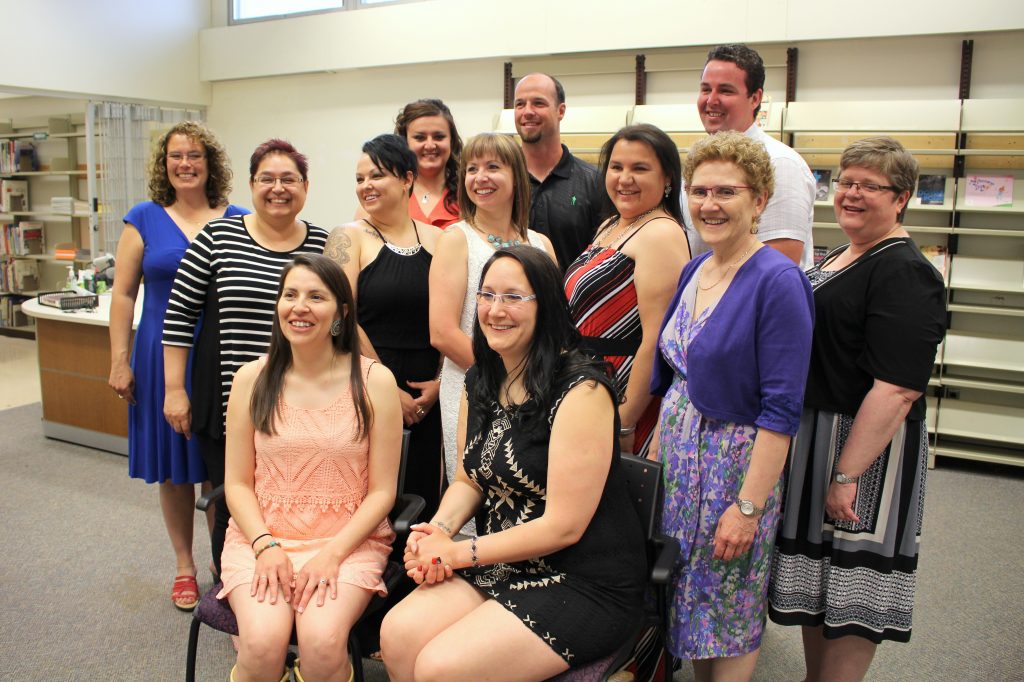
Community-Based Master’s of Education program graduates enjoyed a breakfast together after traveling from northern Saskatchewan to convocate today.
The community-based university education program is designed to provide a unique cohort model of education to students in off-campus locations. The community-based model allows students to obtain a quality university degree in their own communities, considering local educational needs, and it allows them to participate in a cohort that provides immediate and long-term support through a professional learning community. This learning community has also proven to be a northern networking resource, as graduates take on decision making and policy forming roles and responsibilities. The graduate program includes an action research project, which is developed around students’ interests and the needs of their communities.
Congratulations to the Spring 2015 Community-Based Master’s of Education program graduates:
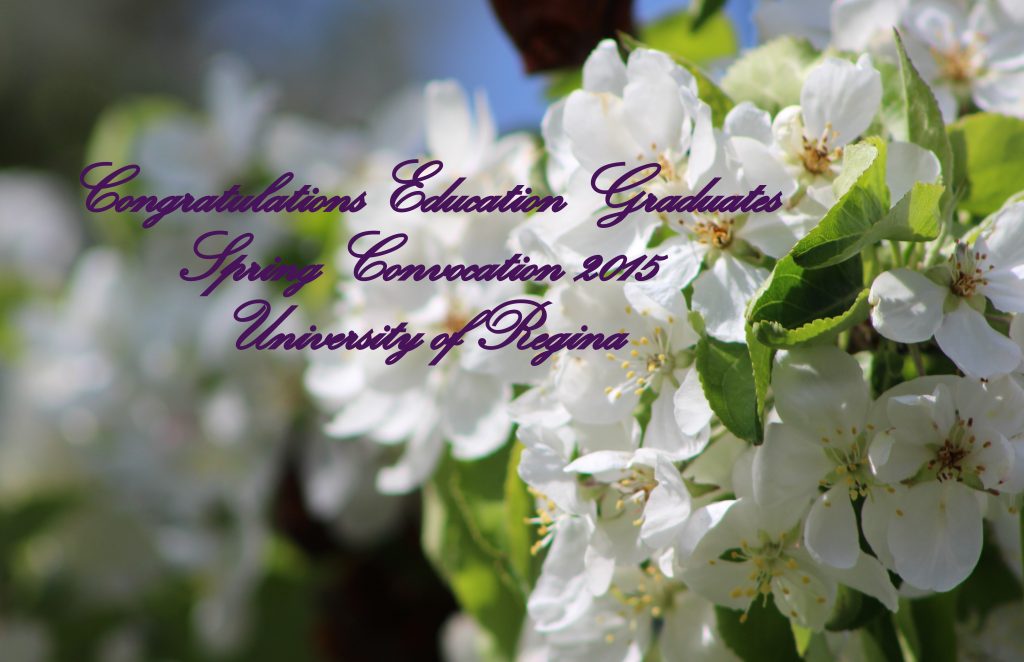
This week, the University of Regina will hold its 41st Spring Convocation ceremonies, June 3 – 5. The following Education students will be recognized for their achievements:
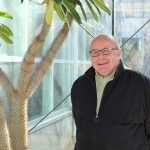
The recipient of the Governor General’s Academic Gold Medal, which recognizes the most outstanding academic performance of a graduate student, is Dr. Darryl Hunter, who graduates with a Doctor of Philosophy in Education.
Education student award winners who demonstrated high academic achievement and a deep commitment to their community are:
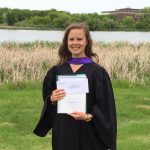
Karyn Booy – Bachelor of Education After Degree (BEAD) Convocation Prize
This prize was established by the Faculty of Education in March 2014 to award, recognize, and encourage BEAD students. The BEAD Convocation Prize is awarded to the most distinguished graduate who has achieved an Outstanding in their internship and who has the highest program grade point average. This award compliments the only other award of the Faculty of Education, the STF prize.

Janelle Zborowski – Saskatchewan Teachers’ Federation Prize
At each University of Regina convocation ceremony, the Saskatchewan Teacher’s Federation (STF) awards a prize to the most distinguished student of the graduating class in the Faculty of Education who does not hold another degree.
Congratulations to these award recipients! Congratulations to all of our Education students who will be graduating today! It’s been a joy to have you as part of our faculty. All the best in your future plans.